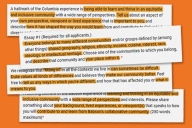You have /5 articles left.
Sign up for a free account or log in.
The University of Chicago will pay $13.2 million to settle a financial aid antitrust lawsuit in which it was one of 17 institutions accused of illegally colluding to limit student financial aid packages.
Now, with the settlement pending approval from a judge, officials from the other 16 institutions must decide what to do: follow the University of Chicago’s lead and settle the lawsuit, or continue an expensive and likely lengthy legal battle.
The remaining defendants are: Brown University, California Institute of Technology, Columbia University, Cornell University, Dartmouth College, Duke University, Emory University, Georgetown University, Johns Hopkins University, Massachusetts Institute of Technology, Northwestern University, University of Notre Dame, University of Pennsylvania, Rice University, Vanderbilt University, and Yale University.
The Settlement
When the lawsuit landed in January 2022, plaintiffs argued that the defendants were running a “cartel” and violating antitrust laws with their approach to calculating financial aid awards, which forced thousands of students to overpay to enroll. Five recent graduates filed the class action lawsuit on behalf of “all others similarly situated.”
Initially, the lawsuit included only 16 colleges but Johns Hopkins was added in February 2022.
The universities involved had long collaborated on financial aid formulas under a federal antitrust exemption dating back to 1994, which also banned them from weighing applicants’ ability to pay in admissions decisions. The lawsuit, however, alleged that defendants did consider family finances in some cases, favoring the children of affluent donors in admissions decisions—including when admitting students from the wait list. Given those practices, the lawsuit claimed that the institutions weren’t entitled to the longstanding antitrust protection they had enjoyed since the 1994 law carved out an exemption for a block of colleges that practiced need-blind admissions, known as the 568 Presidents Group.
The federal antitrust exemption expired last year.
The lawsuit attracted the attention of the U.S. Department of Justice, which filed a statement of interest in July 2022 urging a federal judge to rule against the colleges’ request to dismiss the litigation. Though the DOJ did not take sides, it noted its interest and the historical roots of the issues at hand, including a lawsuit the DOJ filed against Ivy League universities and MIT in 1989.
(In that case, the Department of Justice accused the universities of conspiring on tuition prices, faculty salaries and financial aid packages. The eight Ivy League universities entered a consent decree to cease certain aspects of that collaboration and hold an annual meeting to discuss financial aid for applicants accepted into multiple institutions in the group. MIT, however, fought the DOJ, ultimately settling the case in 1993 after a five-year legal battle.)
Now, three decades later, familiar themes seem to be playing out at a similar set of highly selective colleges. The defendants are all ultra-wealthy institutions with endowments at the end of fiscal year 2022 ranging from a high of $41.4 billion at Yale to a low of $3.2 billion at Georgetown, according to a report by the National Association of College and University Business Officers. By contrast, the median college endowment in the U.S. stands at $203 million.
For the University of Chicago—which has a $13.3 billion endowment and an operating surplus of nearly half a billion dollars, according to its 2021 tax forms—$13.2 million is a tiny sliver of the pie.
Despite the settlement, officials have denied any wrongdoing.
“The University of Chicago is committed to removing financial barriers for undergraduate students who are admitted to the College and is proud of the extensive financial aid we offer to students. The University believes the plaintiffs’ claims are without merit. We look forward to putting this matter behind us and continuing to focus our efforts on expanding access to a transformative undergraduate education,” a spokesperson said in a university statement.
University officials did not respond to follow-up questions from Inside Higher Ed.
What’s Next?
For the 16 universities that have not settled, the legal battle continues. Contacted by Inside Higher Ed, 15 of the 16 defendants declined to comment on the litigation or did not respond.
Only Vanderbilt offered a statement.
“We firmly believe in ensuring financial access to education for all qualified students on the basis of an individual applicant’s complete and factual record. We have a long-standing tradition of actively and aggressively recruiting students from a diverse range of socioeconomic backgrounds,” a Vanderbilt spokesperson wrote in an email. “Our financial aid program, Opportunity Vanderbilt, is recognized as one of the country’s best need-based scholarship programs. We will continue to defend the university’s holistic admissions and generous institutional need-based financial aid practices.”
Whether other universities will pay up and bow out in the near future remains to be seen, but the University of Chicago settlement suggests that the 17 co-defendants were not in lockstep. And legal counsel for the plaintiffs indicated in a news release earlier this week that Chicago will provide “certain information,” such as “documents and a witness interview, that plaintiffs expect will assist them in prosecuting their claims against the sixteen universities that have not settled.” (Legal counsel did not respond to a request for comment.)
Spencer Waller, a professor and Director of the Institute for Consumer Antitrust Studies at the School of Law at Loyola University Chicago, suggested that when one defendant settles in a case like this, it can put more pressure on other to follow suit rather than continue litigation.
He also noted that the discovery in this case is likely to be “very expensive and very intensive.”
“Discovery takes a long time,” Waller said. “Sometimes the plaintiffs learn things that strengthen their case, sometimes defendants learn things that weaken the plaintiffs’ case. If you don’t want to spend your time in discovery for years, there’s an incentive to settle.”
To Waller’s point, legal counsel for the plaintiffs noted in a news release that the defendants “have turned over more than a million documents” since a judge denied a motion to dismiss the case last August. And depositions of financial aid officers and other university employees are ongoing.
He noted that the remaining defendants are likely to spend hundreds of thousands or even millions of dollars in legal fees. Speaking generally about class action lawsuits, Waller suggested that it’s common for plaintiffs to negotiate a smaller payout in exchange for the defendants’ cooperation, as the University of Chicago seems to be doing, according to the plaintiffs’ public claims.
“It’s certainly not odd that a settling defendant would agree to help the plaintiffs, especially if it reduced the amount of cash that they had to pay in such a settlement. And it puts more pressure on other defendants because it tends to strengthen the case of the plaintiffs and lends more credibility to their arguments though it’s not an admission of liability by the University of Chicago,” Waller said.








